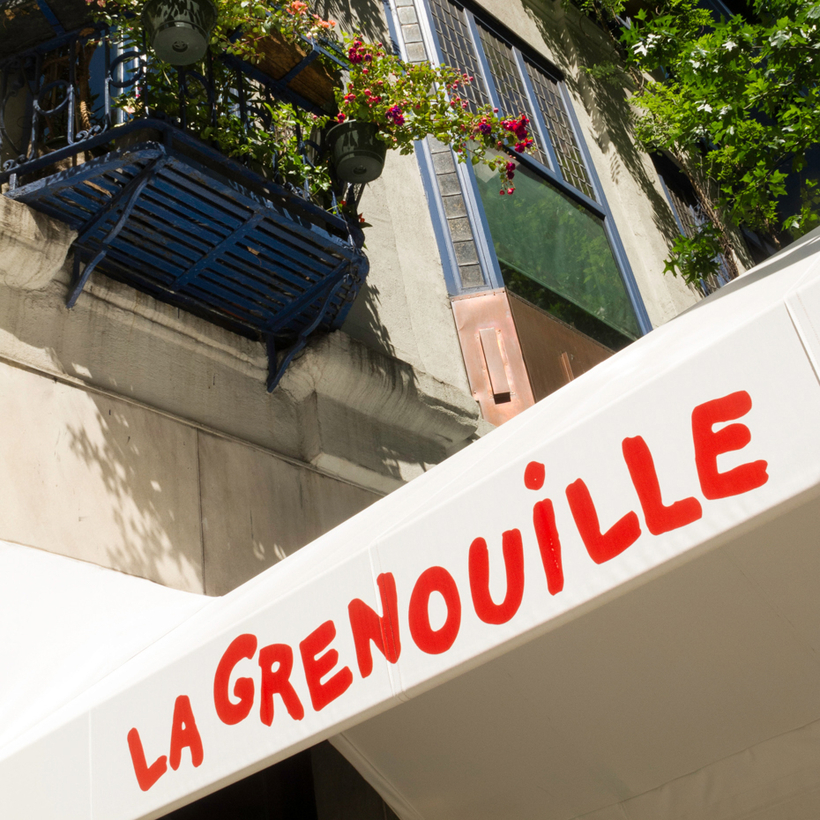It was perhaps inevitable. Ten years after Philippe Masson forcibly took over La Grenouille—the Midtown New York restaurant of infinite charm, grace, and floral beauty—from his older brother, Charles, a closing notice was posted to Instagram just one week before the restaurant’s annual summer holiday was to end on September 19.
Pretty much everything about Philippe’s tenure was clumsy—the bric-a-brac, the dust collecting on faded upholstery, and most notably the amplifier he installed on a cheap parquet stage where a Kiwanis-club spotlight forced dinner guests to look at Philippe as he crooned Sinatra-era songs four nights a week. Even lunch at La Grenouille, long one of the greatest workday treats in the city, no longer offered a refuge after Philippe did away with it.

The notice said that Philippe was “moving on to explore new terrain and pursue other dreams”; it was followed by two paragraphs glorifying his father and extolling Philippe’s own apprenticeships in the old-guard temples of French cuisine—without one mention of Charles, who abandoned his dreams of being an architect and artist and left college at 19 to take over the restaurant when his father was diagnosed with a cancer that quickly killed him.
It was Charles who brought the restaurant new sparkle and life, and maintained acrobatic diplomacy in keeping it alive as other old-line New York French institutions closed one by one. La Grenouille attracted movie stars, literary stars, fashion stars, music stars, high society, and big business: Charlie Chaplin and Marlene Dietrich, Paul Newman and Elizabeth Taylor, Truman Capote and Lee Radziwill, André Leon Talley and Iris Apfel, Mick Jagger and Madonna and Elton John. Seating guests required a working knowledge of who’d been married to, or involved with, whom and what terms they were on now. Who wanted privacy, and who wanted to be seen despite rote protestations. Charles was a master of all this.
Echoing the tin ear and instincts that had governed his time at the helm, Philippe posted his closing notice on September 11.
A Kiwanis-club spotlight forced dinner guests to look at Philippe as he crooned Sinatra-era songs four nights a week.
I talked to Charles last winter, soon after La Grenouille reopened following its holiday vacation—a reopening that was itself in doubt, since the building was conspicuously for sale. He was then in exile in Palm Beach. I spoke to him again on the afternoon of 9/11. He had returned to New York and was on the breezy roof of a tower across from Lincoln Center. How did he feel when he saw the notice?

“It’s a very sad chapter in the life of a great restaurant. It’s sad for everyone.” But he was not surprised. Upon returning to New York, Charles admitted to walking down La Grenouille’s block—52nd Street, between Fifth and Madison—something he generally tried to avoid, “and it was heartbreaking, because you could see that the sidewalk hadn’t been cleaned in a long time. There were signs of bad wear and tear on the canopy. The plantings around the trees were gone. It looked eerily empty. You either strive for excellence, and you do something that’s really great. Or don’t bother.” His other reaction was one of relief: “At least I don’t have to worry anymore about walking past the restaurant.”
What of the dream of lovers of timeless elegance who fantasize that whoever ends up owning the building—Charles assumes it has already been sold because of the odd timing of the closing notice—decides to refurbish it and put it back in the hands of the man who made it sparkle? (Air Mail could not reach Philippe for comment through either the restaurant or his attorney.) If it worked for Le Veau d’Or, which reopened recently after a thorough scrubbing and only partial updating, to the delight of those who missed the Upper East Side fixture, why not La Grenouille?

Absolutely out of the question, Charles says, and for good reasons. “If I were to go back there,” he told me, “it would just continue to stir this horrible anger, hatred, and hostility from my brother. You know, a tug of war takes two people. I’m not tugging.” He also knows that whatever he did, people would say it didn’t have the magic it used to. “It’s a no-win situation, and I’m not going to put myself in that position. Especially when I have a lot to offer to other people who would really appreciate what I can do without having the cloud of the past.”
He hopes that whoever takes it over cleans the sidewalk, mends the canopy, and makes the place shine again. “I wish a restaurateur would buy it and be very successful with this little house,” he says. “It has a spirit of its own. It knew glory, it knew beauty, and it deserves better treatment than what we’ve seen in the last years.” Here’s hoping his wish becomes reality.
Corby Kummer is the executive director of the Aspen Institute’s Food & Society program. A senior editor at The Atlantic, he is also the author of several books, including The Pleasures of Slow Food: Celebrating Authentic Traditions, Flavors, and Recipes


